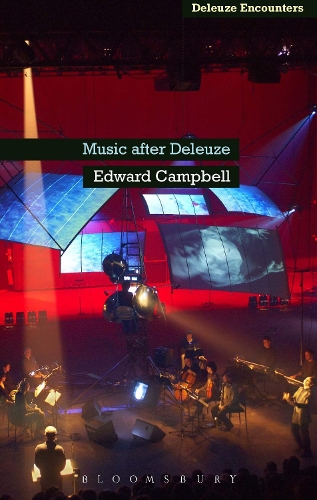
Music After Deleuze
(Hardback)
Available Formats
Publishing Details
Music After Deleuze
By (Author) Dr Edward Campbell
Bloomsbury Publishing PLC
Bloomsbury Academic USA
7th November 2013
United States
Classifications
General
Non Fiction
Theory of music and musicology
780.1
Physical Properties
Hardback
208
Width 138mm, Height 216mm
393g
Description
Music After Deleuze explores how Deleuzian concepts offer interesting ways of thinking about a wide range of musics. The concepts of difference, identity and repetition offer novel approaches to Western art music from Beethoven to Boulez and Bernhard Lang as well as jazz improvisation, popular and sacred music. The concepts of the rhizome, the assemblage and the refrain enable us to think of the specificity of musical works as the meeting of productive forces, for example in the contemporary opera of Dusapin and the experimental music theatre of Aperghis. The concepts of smooth and striated space form the starting point for musical and political reflections on pitch in Western and Eastern music. Deleuzes notion of time as multiple illumines the distinctive conceptions of musical time found in Debussy, Messiaen, Boulez, Carter and Grisey. Finally, the innovative semiotic theory forged in Deleuze-Guattarian philosophy offers valuable insights for a semiotics capable of engaging with the innovative, molecular music of Lachenmann, Aperghis and Levinas.
Reviews
Edward Campbell shows how philosopher Gilles Deleuze, when contemplating music, can steer musicians productively away from their verbal comfort zones. Centring on the contact between Deleuze and Pierre Boulez, Dr Campbell explores and explains some particularly challenging ways of thinking about philosophical and musical modernity. Music after Deleuze proves to be both fascinating and open-ended, and it confirms that the on-going engagement between philosophy and music (non-Western or popular as much as Western and classical) continues to provoke and to intrigue. -- Arnold Whittall, Professor Emeritus of Music Theory & Analysis, Kings College London, UK
Ranging from music close to Deleuzes own interests to musics much further away, this concise and useful introduction will be of much benefit, as much to Deleuzians interested in what music might reveal about Deleuze as to musicians keen to discover what Deleuze might have to tell them about music. -- Martin Iddon, Professor of Music and Aesthetics, University of Leeds, UK
Edward Campbells Music after Deleuze is much more than a primer or introduction. Instead of laboriously dissecting the philosophers work or providing complex theoretical commentary, Campbell explains key Deleuzian concepts in clear, accessible language and uses them to think about music in fundamentally new ways. The book covers a great diversity of musical styles and genres, from popular and jazz through the canonic classical repertoire to non-Western and avant-garde, and in each of these areas, Campbell proves an engaging, perceptive and authoritative guide. Offering fresh and illuminating insights at every turn, Music after Deleuze issues a challenge to received wisdom and conventional thinking and presents a way for music studies to revitalise itself. -- Bjrn Heile, Senior Lecturer in Music, University of Glasgow, UK
With admirable lucidity, Music after Deleuze demonstrates precisely why the ideas of Gilles Deleuze have mattered and still matter to many innovative musicians of today, and at the same time how they enable radical rethinking of the familiar musics and musical practices we take for granted. Tracing the diagonal pathways that connect Deleuze with both his precursors in philosophy (Bergson and Husserl) and the leading composer-theorists of the twentieth century (Schoenberg, Messiaen and, above all, Boulez), Edward Campbell shows how music provided the catalyst for a number of his key concepts. In so doing, he opens the way not just for musicians into Deleuze but also for Deleuzians into the music that has shaped, and been shaped by, his groundbreaking philosophy. -- Charles Wilson, Lecturer in Music, Cardiff University, UK
Music After Deleuze is an important and exciting contribution both to Deleuze Studies and the contemporary philosophy of music, addressing a broad range of topics from a Deleuzian standpoint including difference and repetition, improvisation, and the musical work and its semiotics. With erudition and insight, Campbell nimbly describes for readers the many implications of Deleuze's philosophy for the phenomenon of music in general (from Gamelan to Scottish sacred psalms) with special emphasis placed on the modernism of the Schoenberg School and Boulez. -- Nick Nesbitt, Professor of French and Italian, Princeton University, USA
Author Bio
Edward Campbell is Lecturer in Music at the University of Aberdeen, UK.
